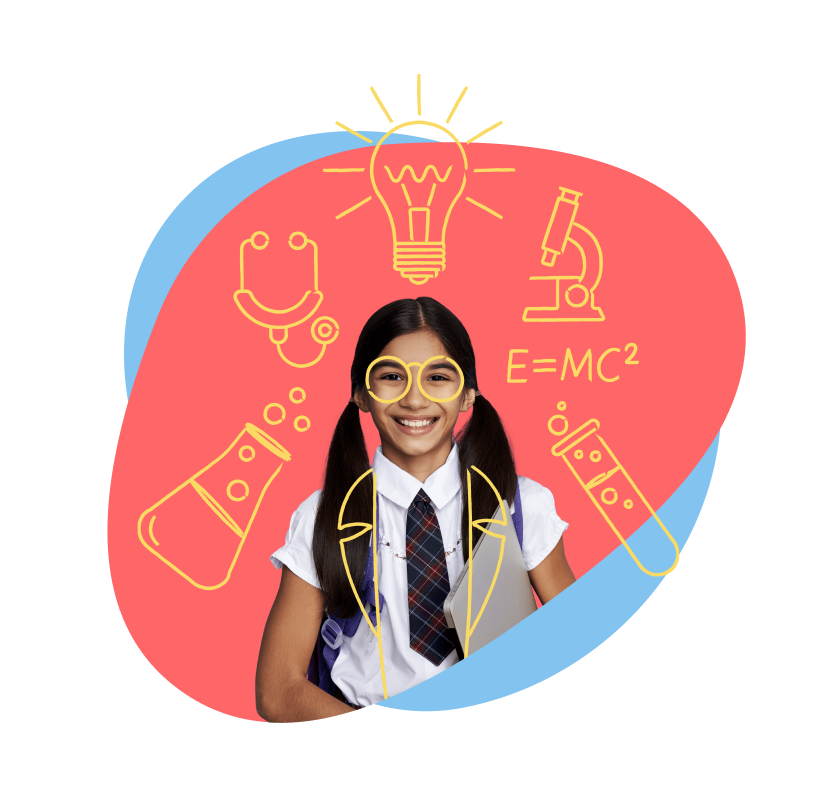Middle school tutoring is a pivotal part of a student’s educational path, offering great academic assistance and direction as they navigate these transitional years. Regardless of whether a middle schooler is grappling with a specific subject or aiming to further their knowledge, tutoring supplies customized support that caters to their unique requirements.
Middle school ages and grades can vary from province to province and school board to school board. In some areas, it is grades 6-8; in others, it’s grades 7-9. Middle school can sometimes also be known as junior high school.
This comprehensive guide equips you with indispensable insights concerning middle school tutoring.
Within this guide, we will go into the advantages of tutoring at the middle school level, the range of subjects that can be tackled, various tutoring approaches, strategies for locating a suitable tutor, and helpful tips for optimizing the tutoring experience. Let’s get into this guide on middle school tutoring and discover how it can empower your child’s educational journey and bolster their academic accomplishments.
- Does tutoring help middle school students?
- Common subjects for middle school tutoring
- How to find a middle school tutor?
- Qualities to look for in a middle school tutor
- Signs your child needs tutoring
- What is cognitive learning?
- Why does cognitive learning help middle school students?
How Can Middle School Tutoring Benefit My Child?
Tutoring in middle school offers a range of benefits, including extra subject review and practice, enhanced subject comprehension, and the invaluable gift of individualized attention, a rarity in crowded classrooms. Whether your child is struggling to keep up or excelling in their studies, tutoring can be the key to their academic success, even during school breaks.
Here are some of the advantages of middle school tutoring:
- Personalized Attention: Tutoring provides one-on-one learning tailored to your child’s unique learning style, pace, and interests. This personalized approach fosters deeper understanding and active engagement.
- Targeted Remediation: Tutors pinpoint specific subjects or areas where a student may face difficulties and offer focused support to bridge knowledge gaps, improving overall performance.
- Building Confidence: Middle school students who receive tutoring often experience a boost in confidence. Tutors offer positive reinforcement, instilling a sense of accomplishment and motivating students to tackle challenges with self-assurance.
- Enhanced Study Skills: Tutoring not only delves into subject-specific content but also imparts valuable study skills. Students learn organizational techniques, time management, and note-taking methods, laying a solid foundation for future academic achievements.
- Enrichment Opportunities: Tutoring can enrich academically advanced students beyond remediation. Tutors introduce challenging concepts, offer advanced materials, and nurture critical thinking skills, igniting a passion for learning.
- Individual Progress Monitoring: Tutors closely monitor your child’s progress, offering regular feedback and assessments. This enables continuous adjustments to the tutoring approach, ensuring optimal results and ongoing growth.
Investing in middle school tutoring can empower your child with the skills and knowledge they need to excel academically and set the stage for a successful future.
Common Subjects for Middle School Tutoring
English Tutoring for Middle School Students
English tutoring for middle school students offers tailored guidance and engaging lessons, strengthening reading, writing, and language skills. Tutors boost confidence, address specific challenges, and ensure students excel in their English studies during their crucial middle school years.

Grade 7 English Tutoring Topics
Reading
- Determine central ideas in a text and analyze their development
- Analyze the structure used to organize a text
- Evaluate and compare arguments and claims
Writing
- Write arguments, supporting claims with reasons and evidence
- Clearly organize ideas, concepts, and information
- Develop and explain a topic with relevant facts, definitions, details, and quotations
Language
- Understand the function of phrases and clauses in specific sentences
- Distinguish between simple, compound, and complex sentences
- Demonstrate understanding and correct use of capitalization, punctuation, and spelling
Grade 8 English Tutoring Topics
Reading
- Determine the meaning of words and phrases, including figurative, connotative, and technical meanings
- Analyze details and themes in a text
- Use evidence to support analysis of a text
Writing
- Use words, phrases, and clauses to create cohesion
- Gather information from print and digital sources for research projects
- Support arguments and claims with reasons and evidence
Language
- Form and use verbs in the active and passive voice
- Use punctuation to indicate pauses or breaks
- Use the relationship between words to understand their meaning
Math Tutoring for Middle School Students
Math tutoring for middle school students delivers personalized instruction and interactive learning experiences, reinforcing mathematical abilities. Tutors boost self-assurance, tackle subject-specific difficulties, and guide students to excel in middle school math, building a strong foundation for future success.

Grade 7 Math Tutoring Subjects
Ratios
- Calculate unit rates associated with ratios of fractions
- Recognize proportional relationships between quantities
- Use relationships to solve ratio and percent problems
Number Systems and Fractions
- Add, subtract, multiply, and divide rational numbers and fractions
- Solve problems involving addition, subtraction, multiplication and division with rational numbers
Expressions and Equations
- Become familiar with solving problems using numerical and algebraic expressions and equations
- Generate equivalent expressions by rewriting expressions in different forms
- Use variables to construct simple equations and inequalities
Geometry
- Draw and construct geometric shapes and describe the relationships between them
- Draw shapes with given conditions, such as specific angles
- Develop problem-solving skills related to area, surface area and volume, with an added skill of measuring angles
Statistics and Probability
- Develop knowledge of statistics and probability
- Work with random samplings to gather and interpret data sets
- Draw informal comparisons about two or more populations
Grade 8 Math Tutoring Subjects
Number Systems
- Understand irrational numbers
- Learn to use rational approximations of irrational numbers to compare their size
Expressions and Equations
- Work with radicals and integer exponents in a variety of situations
- Understand connections between proportional relationships, lines, and linear equations using graphs
- Analyze and solve linear equations
Functions
- Define, evaluate and compare functions in a variety of ways
- Use functions to model linear relationships between quantities, using appropriate graphs and charts
Geometry
- Understand congruence and similarity using physical models and geometry software
- Solve real-world problems involving volume, using cylinders, cones, and spheres
- Apply the Pythagorean theorem to determine unknown side lengths and the distance between two points
Statistics and Probability
- Develop skills in statistics and probability
- Investigate patterns of association, using techniques such as scatter plots, tables, and charts
Science Tutoring for Middle School Students
Science tutoring for middle school students provides individualized support and hands-on learning experiences, helping them grasp complex scientific concepts. Tutors enhance confidence, address knowledge gaps, and empower students to excel in their middle school science studies, laying the groundwork for future academic achievements.

Grade 7 Science Tutoring Subjects
Structure & Properties Of Matter
- How substances are made from combinations of atoms
- Different types of energy
- Chemical reactions and the effects of thermal energy
- How light is affected by different materials
Force & Motion
- Gravitational, electrical, and magnetic forces
- Newton’s Third Law
- Relationships between energy and forces
Life Science
- Dynamics and cycles of ecosystems (producers, consumers, and decomposers)
- Interdependent relationships in ecosystems
- Growth and development of organisms (inheritance and variation of traits)
Earth Systems
- Patterns of the sun, moon, and stars
- The role of water in Earth’s surface processes
- Human impacts on Earth’s environment
Grade 8 Science Tutoring Subjects
Structure & Properties Of Matter
- How substances are made from combinations of atoms
- Different types of energy
- Chemical reactions and the effects of thermal energy
Force & Motion
- Gravitational, electrical, and magnetic forces
- Newton’s Third Law
- Relationships between energy and forces
Life Science
- Dynamics and cycles of ecosystems (producers, consumers, and decomposers)
- Interdependent relationships in ecosystems
- Growth and development of organisms (inheritance and variation of traits)
Earth Systems Science
- Patterns of the sun, moon, and stars
- The role of water in Earth’s surface processes
- Weather and climate
Check out these 7 ways tutors help your child with back to school.
How Do You Find a Middle School Tutor?
Oxford Learning, with over 120 locations throughout Canada, is the top choice for parents. Distinguished as Canada’s sole tutoring program centred on cognition coaching, Oxford Learning transforms setbacks into strengths, empowering middle school children’s minds to strive for greater achievements.
Search for a tutoring centre near you.
Qualities to Seek in a Middle School Tutor
When seeking a tutor for middle school students, it’s vital to find someone who possesses the following qualities.
- Establishing Connection and Professionalism. Look for a tutor who can build a strong connection with your child. They should approach their role professionally, maintaining clear communication while demonstrating reliability and punctuality.
- Bringing Energy and Enthusiasm. An effective middle school tutor should infuse each session with energy and enthusiasm. Their passion for the subject matter can inspire the student and make the learning process engaging and enjoyable.
- Being Caring and Supportive. A caring and nurturing tutor creates a supportive learning environment. They should genuinely care about the student’s progress, well-being, and overall development. This fosters trust and encourages students to ask questions and seek help when needed.
- Flexibility and Adaptability. Middle school students have diverse learning styles and needs. A tutor who can adapt their teaching methods and strategies to accommodate different learning preferences is invaluable. Tutors should also be flexible in scheduling sessions and adjusting their approach based on the student’s progress.
- Respectful and Understanding. A great middle school tutor understands students’ challenges and respects their circumstances. Tutors should be patient, empathetic, and capable of explaining concepts to suit the student’s comprehension level. Mutual respect between the tutor and student is essential for effective learning.
When selecting a middle school tutor, consider these qualities alongside their qualifications, experience, and subject expertise. Finding a tutor who can facilitate academic improvement and create a positive, supportive learning environment for the student’s overall growth is crucial.
Learn more about Middle School tutoring programs.
5 Signs Your Child Needs Tutoring
Is your middle school student encountering challenges in their academic journey? Recognizing the signs that your child could benefit from tutoring is essential to helping them regain confidence and excel in their studies. Here are some key indicators to watch out for.
- Declining Academic Performance If you observe a consistent decline in your middle school student’s grades, it may indicate that they are struggling with specific subjects or concepts.
- Homework Avoidance or School Aversion When your child starts avoiding homework or shows a lack of enthusiasm for attending school, it could signal a need for additional support, such as a middle school tutor.
- Inconsistent Homework Time An imbalance in the time your middle school student dedicates to homework may suggest they require assistance in understanding the material or are rushing through it without grasping the concepts.
- Difficulty in Grasping or Retaining Concepts If your middle school student struggles to comprehend new ideas or has difficulty retaining what they’ve learned, seeking middle school tutoring can help reinforce their understanding.
- Disorganization Regarding Schoolwork If you notice disorganized schoolwork management, such as misplaced assignments, missed deadlines, or challenges in prioritizing tasks, it may indicate a need for middle school tutoring to enhance organizational skills and study habits.
By identifying these signs early on, you can give your middle school students the tailored guidance they require to thrive. Middle school tutoring offers personalized attention, reinforces foundational knowledge, and instills effective learning strategies. Remember, every student learns at their own pace, and seeking support is a positive step toward unlocking their full potential.
Understanding Cognitive Learning in Middle School
Cognitive learning is an approach to education that empowers middle school students to harness their mental faculties more effectively. This learning method is dynamic, constructive, and enduring, fostering active involvement in the learning process and ultimately making learning, critical thinking, and retention more accessible.
This learning styles transcends more than just memorization or repetition; it’s about cultivating genuine comprehension and equipping students with the skills to become better learners.
Cognitive learning strategies for middle school students encompass:
- Requesting that students reflect on their experience
- Assisting students in finding fresh answers to challenges
- Promoting debates regarding what is being taught
- Assisting students in exploring and comprehending how ideas are linked
- Requiring students to defend and explain their reasoning
- Using visualizations to promote student comprehension and retention
Cognitive learning in middle school aims to empower students with knowledge and the cognitive tools and skills they need to become effective, self-driven learners throughout their academic journey and beyond.
Why Does Cognitive Learning Help Middle School Students?

Cognitive learning proves to be a game-changer for elementary students, ensuring that knowledge is not merely memorized temporarily but deeply understood. By employing this learning approach, elementary school students can attain a profound and lasting grasp of concepts in subjects like mathematics, English, science, and even languages like French.
Cognitive skills serve as the differentiating factor between proficient and average learners. When cognitive skills are underdeveloped, children may struggle to integrate new information as it’s presented to them.
It’s essential to remember that learning and assimilating new information is pivotal for successful education, making the development of cognitive skills a matter of utmost importance.
Cognitive learning contributes by:
- Helps identify elementary school students’ preferred learning styles, whether they are visual, auditory, kinesthetic, or exhibit other learning tendencies
- Guides students to approach learning with a broader perspective, enabling them to grasp how small concepts connect to form larger ones
- Sassists students effectively and efficiently applying newly acquired ideas, facilitating practical implementation
Incorporating cognitive learning strategies into elementary education empowers young learners to excel academically and develop essential cognitive skills that will be a strong foundation for their future educational endeavours.
Ready to see how Oxford Learning can help your middle school child? Enrol now.




